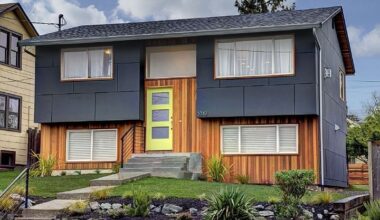Sometimes buying a manufactured home is trickier than buying a typical house. A manufactured home is constructed in a factory and transported to its final location in pieces. Whether you’re planning on buying a house on land you own or lease a lot in a manufactured home community, you’ll need to make sure you’re taking the right steps and get to know its pros and cons.
What is a Manufactured Home?
Prefabricated manufactured homes are constructed at a facility off-site before being delivered to their final location. They are the most recent evolution of mobile homes, and their construction is required by the HUD code. Unlike their forebears, manufactured homes can be set up on either a temporary or permanent basis.
Buying a Manufactured Home
The majority of manufactured homes are offered by merchants, who provide both new and used options. On some general real estate listing websites, through online manufactured home markets, and through real estate brokers, you can also find pre-existing manufactured homes. Additionally, in some jurisdictions, you can purchase directly from the developer of manufactured homes.
It’s something like buying a vehicle, but without the haggling, when you buy a manufactured home from a retailer. On the same day that you apply for manufactured home finance, you can tour model homes on the sales lot, select the personalized features you desire, and make your decision. There are single-, double-, and triple-section floor designs available, ranging from 500-square-foot residences with one bedroom and one bathroom to 2,500-square-foot homes with four bedrooms and three bathrooms. The delivery and installation are typically coordinated by the store.
According to the Manufactured Housing Institute, most manufacturers provide warranties that cover the building’s plumbing, heating, and electrical systems for a specific period, often one to five years. There may be warranties available for some appliances. Request information from the vendor.
Manufactured Home vs. Mobile Home
The term “mobile home” refers to manufactured residences built before June 15, 1976. These houses were mobile, as the name suggests. Early types of mobile houses gained a negative reputation since they were frequently poorly constructed and lost value fast.
But since then, mobile homes have advanced significantly. Mobile homes today aren’t designed to be relocated more than once. They are also significantly more secure and comfy structurally. Mobile homes come with a wide range of facilities and floorplans, including fully functional kitchens and roomy bedrooms.
Although they are still frequently referred to as mobile houses colloquially, newer mobile homes constructed after June 15, 1976, are now officially referred to as manufactured homes. Even if upgrades have been made, mobile homes built before this period are not considered manufactured homes.
Modular Home vs. Manufactured Home
In a factory, modular dwellings are also manufactured. However, they are constructed in pieces that are sent to the location and fitted together on a sturdy base. The home is hardly ever transferred once more. These types of homes must abide by the same federal, state, and municipal building requirements as site-built homes, but they are not required to fulfill the same HUD standards as manufactured homes.
Buying a Manufactured Home Pros and Cons
There is no perfect type of home for every buyer. Here are some considerations to make when deciding whether to buy a manufactured home.
Manufactured-home pros
- Accessibility: Manufactured homes are more affordable than other types of housing. According to the Urban Institute, the price of a new manufactured home is up to 47% less expensive per square foot than a comparable site-built home, excluding land.
- Flexibility: You can customize the home by selecting from a range of features and upgrades.
- Energy-efficient and secure: Manufactured houses must adhere to HUD’s safety and security requirements.
Manufactured-home cons
- Finding financing can be challenging. Because not all manufactured homes are considered real estate, you might not be eligible for a conventional mortgage or manufactured home loan. To finance the purchase of a manufactured home, you can wind up paying higher interest rates.
- There are geographical restrictions because manufactured homes don’t come with a lot of their own. You must also purchase a piece of land for your house, whether it’s in a community for mobile homes or on its own. And that entails other expenses in addition to the home.
- Negative stigma: Despite vast improvements in safety and aesthetics over the past few decades, manufactured homes and parks still carry a bad reputation.
Buying a Manufactured Home with Land
You will probably still need to start your search by locating each separately if you want to buy both the manufactured home and the land. Where would you like to reside? Which home should you build on that land? You should start your search with these two categories in mind unless you’re buying an already-built manufactured home along with the land on which it is situated. There are ways to legally and financially combine the entities as you proceed along the process.
Finding land for your mobile home
There are numerous approaches to finding land for a manufactured home. First off, you at least somewhat know where you want to live. You may base your choice on a location’s proximity to your place of employment, the quality of the local schools, or just the home’s sense of community.
You may search for mobile homes for sale with the land around the US on MHVillage by city, county, or zip. Referencing the local MLS is a further effective means of looking for available open land. Through a housing authority or county land bank, you might be able to go through listings of real estate that the county has purchased and cleared.
You can also work with a realtor. Or perhaps you’ve already begun your hunt for a home. If so, the proprietor or a salesperson at your favorite manufactured home dealership or retailer can be an excellent source of information on how to choose land for a mobile home.
Your sales representative can talk to you about the kind of land you have in mind, the infrastructure that is in place, and any additional site preparation that might be necessary. But keep in mind the conventional method of finding land for a manufactured home! Enter the region by car. Enjoy the communities or rural characteristics you are contemplating by taking your time. Search for open lots and signage advertising land for sale.
Mobile home installation on land
Since we began by talking about the land—the actual real estate component of the purchase—we’ll stay here for a while to address mobile home delivery and transportation, site preparation, home installation, and setup. You may need to drill a well for water if you are considering purchasing land in a township or county. Is the land close to or connected to public utilities? How much grading is required? Which foundation type will be employed, and how will the home be fastened and secured? All of these inquiries must be addressed in advance of installing a mobile or manufactured home on a piece of land. There is an incalculable effort and financial investment behind each question mark. Unfortunately, until the land has been identified and surveyed, nobody will be able to respond to those queries.
How to Buy a Manufactured Home on Land
Contrary to buying traditional real estate, purchasing a manufactured home on land involves a separate procedure. For information on laws, licenses, and the procedure for buying a manufactured home on land in your state, get in touch with the Manufactured Housing Association.
Following are six steps for purchasing and financing a mobile home on land.
#1. Choose a site for your manufactured home
Before buying a manufactured home, choose whether you’ll put it on your land or in a manufactured home community. Study the zoning regulations and any other requirements that may apply if you’re buying land or putting the manufactured home on the property that you already own. Find out what size home it can accommodate and other restrictions if you intend to lease land in a community for manufactured homes.
#2. Look for manufactured home
Unless you’re buying a conventional model or an existing manufactured home, work with your manufactured home retailer to customize your home.
#3. Obtain funding
To evaluate your alternatives for manufactured home financing, speak with a lender, mortgage broker, or the retailer of your manufactured home. Similarly, if you’re thinking about taking out a personal loan or a chattel loan, compare lenders and loan terms.
#4. Set up the home location
To ensure that the location is prepared for the installation of your home, your retailer will collaborate closely with you. This includes obtaining the required licenses, taking care of any problems that arise during home installation, and setting up utility hookups.
#5. Arrange for your home’s delivery and setup.
Once the land or lot is ready, your home is delivered and put in place.
#6. Sign up for insurance
To avoid potential issues or delays, you must insure the home and complete any other occupancy and maintenance requirements before you can move in.
How Much Does a Manufactured Home Cost?
According to information from the U.S. Census Bureau as of August 2019, the average price of a new manufactured home in the United States is $84,100. However, the cost of a manufactured home varies depending on the location and size of the home, therefore a wide variety in cost is to be expected.
The average price of a single-wide manufactured home is $45,700 in the Northeast and $48,200 in the West, according to the Census. These costs are considerably lower than the average price of a site-built home without buying land, which, according to 2018 Census statistics, is $297,747.
Conclusion
Homebuyers should do their homework before buying a manufactured home on land to be sure they are making a sensible investment in a home they will feel at home in. Many homebuyers can achieve homeownership more quickly than ever by learning how to buy, finance, and maintain a manufactured home.
Frequently Asked Questions
Why you should not buy a manufactured home?
Buying a mobile home has the drawback of a rapid value decline. Similar to a new car, the value of a mobile home rapidly decreases after it leaves the factory. On the other hand, because the owner of a stick-built home almost invariably also owns the underlying land, stick-built homes typically increase in value over time.
Is a manufactured home a good investment?
History and data indicate that manufactured homes are gradually overtaking stick-built homes as the favored option. For those who rent them, their rising sales, cheap expenses, and the freedom to live in a home with comparable facilities as a site-built home are selling features, making this asset a successful investment.
Does a manufactured home require special financing?
Buying a manufactured home is very similar to buying any other type of home. But whether you already own property, intend to rent property, or plan to buy property may affect the loan you receive. The majority of manufactured home dealers can assist in making contact with lenders and offer support and direction all along the way.
How long will it take to sell my mobile/manufactured home?
Depending on several variables, homes can sell in as little as a few days. If your home is on the ILT and you own it free and clear, this means you paid sales tax when you bought it and you must pay a yearly registration fee. It may take a few days if your buyer has funds.






